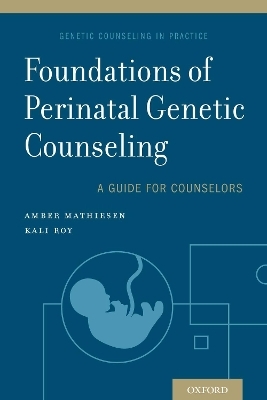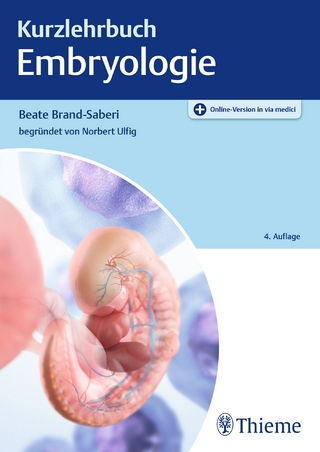
Foundations of Perinatal Genetic Counseling
Oxford University Press Inc (Verlag)
978-0-19-068109-8 (ISBN)
Foundations of Perinatal Genetic Counseling is a practical introduction to the concepts and skills in genetic counseling with clients before and during pregnancy. Authored by genetic counselors at the forefront of contemporary perinatal practice, this all-in-one reference provides an accessible yet comprehensive overview of:
· the basics of pregnancy, including assisted reproductive technologies and high-risk pregnancy management
· preimplantation and prenatal genetic screening and diagnosis
· the structure and goals of a genetic counseling appointment
· common clinical scenarios and best-practice approaches
Distilling the most pertinent information for new learners and practicing counselors, Foundations of Perinatal Genetic Counseling is an essential companion for both classroom and clinic. Perinatal genetic counselors will find themselves returning to this unique resource long after their training has come to an end.
Amber Mathiesen, MS, LCGC, is a licensed and board-certified genetic counselor in prenatal genetics at University of Utah Health, co-director of the perinatal genetics course at the University of Utah's Graduate Program in Genetic Counseling, and a prenatal rotation supervisor. She also acts as a research committee member and mentor for various genetic counseling students. Kali Roy, MS, LCGC, is a perinatal genetic counselor at University of Utah Health and co-director of the perinatal genetics course at the University of Utah's Graduate Program in Genetic Counseling. She graduated from the University of Utah Graduate Program in Genetic Counseling and completed a Master's of Science in Human Genetics and Genomics at the University of Connecticut.
Preface
Acknowledgments
Common Abbreviations
1. Pregnancy Basics
1.1 Pregnancy Timeline and Dating
Pregnancies are Counted in Weeks
Gestational Age versus Embryonic Age
Normal Pregnancy Timeline and Duration
Methods for Dating
Guidelines and Recommendations for Determining Dating
Tools Available for Calculating Gestational Age
1.2 Pregnancy Care
Types of Prenatal Providers
Routine Prenatal Visits
Prenatal Panel
Complete Blood Count
Blood Type and Antibody Testing
HbA1c for Diabetes
Fetal Imaging
Complicated Pregnancies
1.3 Documenting a Pregnancy History
Gravida and Para
Calculating Gravidity and Parity (G's and P's)
2. The Perinatal Genetic Counseling Appointment and Family History
2.1 The Perinatal Genetic Counseling Session
2.2 Obtaining a Pregnancy History
2.3 Obtaining a Family History
2.4 Interpreting a Family History
Mendelian Conditions
Multifactorial Conditions
Consanguinity
Birth Defects
Intellectual Disability and Autism
Pregnancy Loss and Infertility
Unknown Etiologies
Accuracy
Other Conditions (Referrals)
2.5 Unique Situations in the Perinatal Family History
Gamete Donation
Same Sex Couples
Surrogacy
Adoption
Ethnicity
3. Prenatal Screening
3.1 Evaluation of a Screen
Sensitivity
Specificity
Positive Predictive Value
Negative Predictive Value
Personal Utility
3.2 Prenatal Screening Options
Maternal Serum Screening
Multiples of the Median (MoM)
Calculating the Risk
Timing and Test Options
Results
Pattern Association
Follow up of Abnormal Results
Limitations of Maternal Serum Screening
Cell Free DNA Testing
Origin
Fetal fraction
Clearance
Methodology
Conditions Analyzed
Test performance
Who to offer testing to?
Multiples and Vanishing Twins
Adverse Pregnancy Outcomes
Considerations Prior to Testing
Results and Follow up
Resources
4. Prenatal Diagnosis
4.1 Techniques
Chorionic Villus Sampling
Twins
Risks
Limitations
Amniocentesis
Twins
Risks
4.2 Testing Options
Karyotype
Fluorescence in situ Hybridization (FISH)
Microarray
Molecular Testing
AFP &AChE
Other Testing
4.3 Indications for Diagnostic Testing
5. Common Indications
5.1 Age Related Risks
Maternal Age
Paternal Age
5.2 Personal and Family History
Single Gene Conditions
Aneuploidy
Multifactorial Conditions
Birth Defects
Intellectual Disability/Developmental Delay/Autism
Consanguinity
5.3 Ultrasound Anomalies
Counseling for Ultrasound Anomalies
Classification of Ultrasound Findings
Estimating Risks
Ultrasound Findings in Pregnancies with Aneuploidy
Down syndrome
Trisomy 18
Trisomy 13
Turner Syndrome
Triploidy
Common Ultrasound Findings
Hallmark Ultrasound Findings Associated with Genetic Conditions
Open Neural Tube Defects
5.4 Teratogens
5.5 Recurrent Pregnancy Loss, Stillbirth, and Infertility
Evaluation of Pregnancy Loss and Stillbirth
Evaluation of Infertility
Male Infertility
Female Infertility
5.6 Preconception Counseling
6. Carrier Screening
6.1 Background
Who Should be Offered Carrier Testing?
Carrier Screening for Gamete Donors
Timing of Screening
Evaluating Risks
Positive Test Results
Negative Results and Residual Risks
Other Types of Results
Application of a High Risk Result
Repeat Testing
Newborn Screening
6.2 Condition Directed or Ethnicity Based Testing
Cystic Fibrosis
Spinal Muscular Atrophy
FMR1-Related Disorders
Ashkenazi Jewish and French Canadian/Cajun
Hemoglobinopathies
Family History
6.3 Expanded Carrier Testing
7. Pregnancy Management
7.1 Reproductive Options
Continuation of Pregnancy
Adoption
Termination
First Trimester
Second Trimester
Later Term
Twins
7.2 Pregnancy Management Referrals
Maternal-Fetal Medicine Specialist
Specialized Imaging
3D Ultrasound
Echocardiography
MRI
Cardiology
Neonatology
Fetal Surgery/Intervention
Pediatric Surgery
Pediatric Specialists
Pathology/Autopsy
Palliative Care/Hospice
7.3 Support Referrals and Bereavement
8. Assisted Reproductive Technology and Reproductive Options for the At Risk Couple
8.1 Reproductive Options for At Risk Couples
8.2 Assisted Reproductive Techniques
8.3 Preimplantation Genetic Testing
Preimplantation Genetic Screening (PGS)
Preimplantation Genetic Diagnosis (PGD)
9. Common Perinatal Genetic Counseling Situations
9.1 Pregnancy Termination
Misinterpreted Intent
Patient Provider Conflict
9.2 Incidental Findings
Misattributed Paternity
Discovery of Consanguinity
Identification of an Incidental Condition
9.3 Privacy and Confidentiality
Genetics is a Family Affair
Secret Information
9.4 Working with couples
Couples in Conflict
"It's not my body"
9.5 Dealing with Uncertainty
Fetal Diagnosis and Prognosis
Family History
Complex Conditions
Variants of Uncertain Significance
9.6 Fetal Sex Disclosure
Patient's Desire to Know or Not
Testing may Reveal Sex Chromosome Abnormalities (SCAs)
Disorders Affecting a Specific Sex
Testing Only for Sex
Fetal Sex may be "Difficult News"
9.7 Patient Questions
"What would you do?"
When You Don't Know the Answer
9.8 Testing a Fetus for Adult Onset Condition
9.9 Barriers for Consent
Patient Understanding
Voluntary Participation
9.10 Rapidly Evolving Technologies
Appendix A
Appendix B
Index
| Erscheinungsdatum | 02.08.2018 |
|---|---|
| Reihe/Serie | Genetic Counseling in Practice |
| Verlagsort | New York |
| Sprache | englisch |
| Maße | 208 x 137 mm |
| Gewicht | 340 g |
| Themenwelt | Medizin / Pharmazie ► Gesundheitsfachberufe |
| Medizin / Pharmazie ► Medizinische Fachgebiete ► Pädiatrie | |
| Studium ► 1. Studienabschnitt (Vorklinik) ► Histologie / Embryologie | |
| Studium ► 2. Studienabschnitt (Klinik) ► Humangenetik | |
| ISBN-10 | 0-19-068109-8 / 0190681098 |
| ISBN-13 | 978-0-19-068109-8 / 9780190681098 |
| Zustand | Neuware |
| Informationen gemäß Produktsicherheitsverordnung (GPSR) | |
| Haben Sie eine Frage zum Produkt? |
aus dem Bereich


